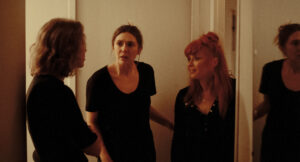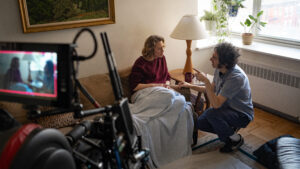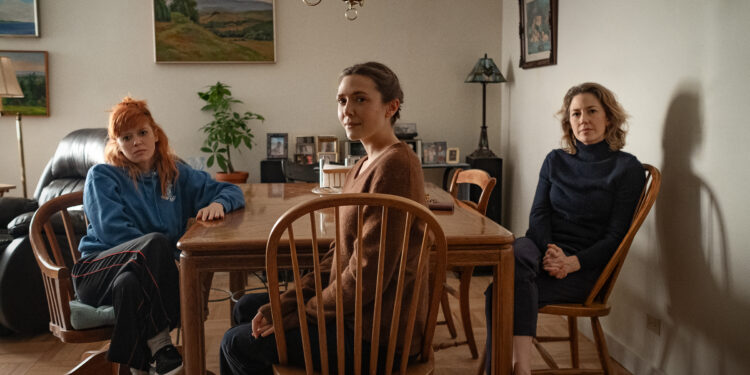Revisiting Azazel Jacobs’ His Three Daughters felt like its own special reunion. I saw his latest at the Toronto International Film Festival in 2023, and it hit me like a ton of bricks then–I remember just sitting in my seat as the credits ended. Watching it again at home felt even more intimate, and my thoughts, like many I am sure, wandered about to my own memories of my relationship with my parents. If you are from a fractured or less-than-idyllic family, Jacobs’ latest, chronicling three sisters reuniting at the precipice of their father’s death, will leave a lasting impression. As emotions run high in a tight New York City apartment, there is nowhere for all of this fear, regret, and anger to go except for on each other. Jacobs’ script, which was recently recognized with a Gotham Award nomination, delves into how we behave around our families, but it also investigates how childhood and memory stay present even as we leave to lead our own lives.
Every film should start with Carrie Coon speaking a pointed, hard monologue. Her Katie stands against a blank, white wall as she grills her sisters, Elizabeth Olsen’s Christina and Natasha Lyonne’s Rachel, about the state of their father, Vincent. Coon delivers Jacobs’ lines like a cinderblock on a gas pedal, while looks from both her sisters establish their personalities and what’s to come without using dialogue.
“There’s always this sense with each film that when you finish that that’s going to be the last film that you’ll get to make,” Jacobs admits. “As I was dreaming about this next one, there was a real urgency of feeling like I’m going to go out as hard as I possibly can. There was something that felt very raw at that moment in my life, and that was the first line that I wrote. ‘So, you’ve been good, right?’ is so not a question. It’s so aggressive. There are so many things wrong with that as a first line of saying that, and if someone is asking that, you’re clearly not good. I started writing that line and there is the idea that there was no gap in space at all between that line and the next one which is something about having to handle everything like adults.

“There’s already this conflict that I found, and it felt like coming from that sense of desperation of wondering if I was going to get to make another movie. I want these characters to be that forceful about their vitality and their kind of confusion, and what it means to be alive in this particular moment. What I was going through with my own parents at the point of just saying everything. I’ve been so drawn to people that just hold everything back, and this was a chance to find a character like Katie that couldn’t do that at all.”
Almost everything happens in this confined apartment–there’s nowhere to run from the looming arrival of death. Christina will do yoga and meditate while Rachel smokes weed any chance she can. Katie tries to busy herself with seemingly menial tasks while commenting on the state of the space. Jacobs allows us to consider the last times that these women returned to this apartment. What remains the same? When anger boils over, it’s placed on all of them with no escape.
“That apartment was as clear to me as the casting of those leads. When I was writing the script, I could see Natasha, Carrie, Lizzie, and Devon–that’s what I was writing for–and the same goes for the space. It just was a specific type of apartment that locks in every fight that’s ever happened and every kind of big or major event. I reached out to so many kids that I grew up with here in New York City to find if there was a chance that I could shoot in their place, but I realized that I didn’t want to mess up the rent stabilization situation.
“You walk into certain people’s places that have been there and you think, ‘Not only is it this family’s ups and downs, but it’s multiple families that have happened before this.’ It’s stuck in these walls. There’s something about these older buildings that were built in such a way that just doesn’t happen now. They’re just thick–the beams, the walls. They’ve been soaking up all these kicks and whatever things have been spilled.”
As we spoke about spaces that we recognize in the backs of our minds, it reminded me of the dining room chairs in the house that I grew up in. The head of the table was the only one that had arms on it, and I never felt like I should sit there since it was the head of the table. Jacobs recalls how we never expect spaces or memories to change, even when we don’t think about them every day.
“I was walking by my high school and I saw that the doors were open, and I walked into the lobby,” he says. “Just to see what it felt like to walk in thirty something years later, because I haven’t gone back since I was seventeen. That sense of walking in and finding out what has changed gave me such pain. I didn’t want the idea that this had gone on. It’s unfair. Maybe I felt like it betrays my memory of it? It was like that stuff doesn’t change once I go, does it?”

After their father dies, Christina and Katie will return home to their families as Rachel tries to make her own way. How much of this time together will affect their immediate time at home? Are these two sisters the same at their father’s apartment as they are with their respective children and spouses? Will this time stay solely with them, or will they share the resentment, joy, and expressions of love with their other loved ones?
“It’s something that I got a chance to discuss with both of them quite a bit,” Jacobs says. “With Christina, each time she calls, it’s her calling them, and it’s always interrupting something. It’s always like there’s not really space for her once again in the same way that the father says. She’s managed to be okay. I wonder and I hope if Christina, after going through this experience and getting to vocalize some of this sense of being, that she had to take care of herself. I like to think that Christina goes back with some sense of an apology from her father, even though it’s a bit of a dream. She has to use her superpower strength of what she does to comfort her own kid with that nursery rhyme with her sisters.
The conversation that I had with Carrie Coon about is like to discover that her kids do get fed and they do get to school on time, and maybe she can let go of some things. It might be shocking to her that things will turn out all right. I like to think of her coming back somewhat differently and that her relationship with Rachel will be not the same. Beyond the gibberish language, I do believe that they are more connected to each other than Christina is. That language between Christina and Katie is theirs and it tells the story of what their special bond truly means. Maybe Katie will need space away from her kids and pop by to see Rachel?”
Even though Rachel, Katie, and Christina bicker throughout His Three Daughters, there comes a beautiful moment of shared sisterly connection when they listen to their father speaking to them. They are touching one another and physically pivoting around the room as a unit. It might be the first time in their lives that they connected since they were younger girls. It’s pure, and Jacobs insists that it came naturally in the moment.
“That was something that organically happened,” Jacobs says. “I had ideas for shooting that scene and the blocking, and they had been intertwined with each other. We shot that the very last day–we shot this in order–so they had become really connected by that point. When Jay takes a seat on the window, they moved in tandem as they held onto each other and listened. I think that emerged because of the way that we shot this and how their connection felt as performers. It’s very uncommon for everyone to be off-book on day one–these actors did not mess around. Down to the period, down to the comma, down to the spaces between the words.”
His Three Daughters is streaming now on Netflix.










SO glad to see this magnificent gem getting some coverage.
With Emilia Perez being the big Netflix focus of the streamer (Itself a superb picture), it feels rather sad to this His Three Daughters being neglected despite its incredible script and superlative performances.